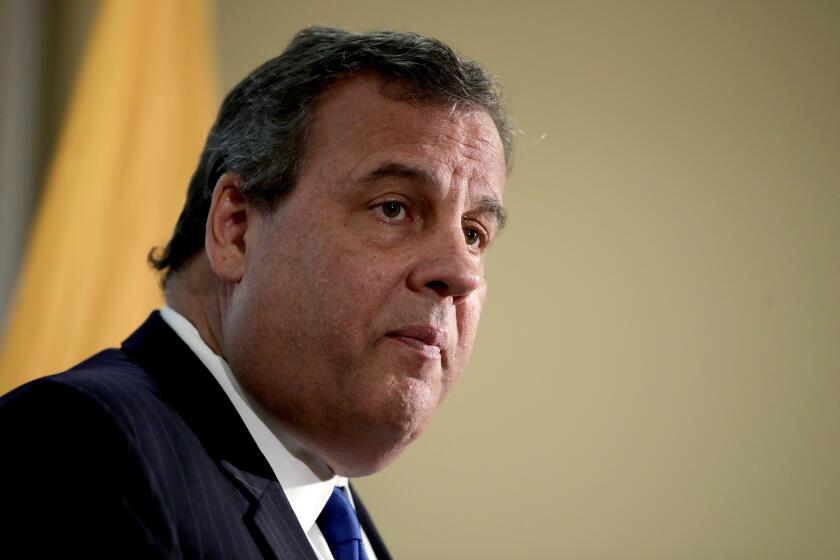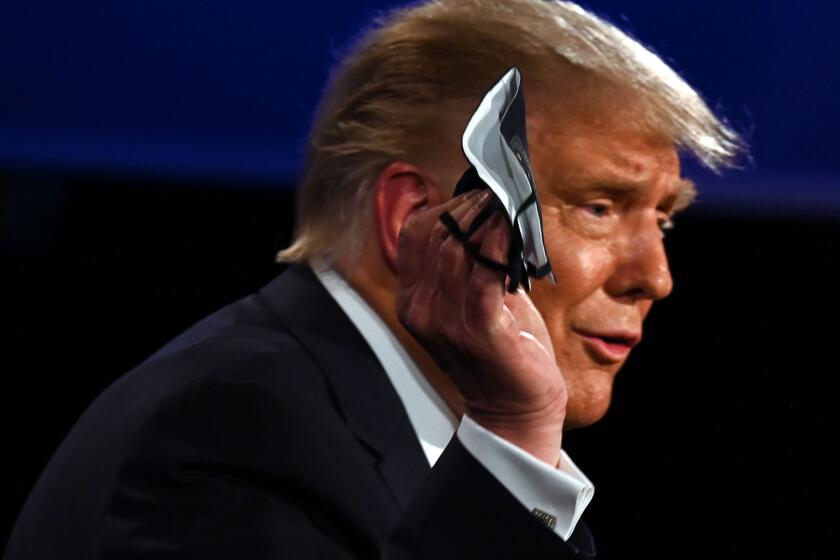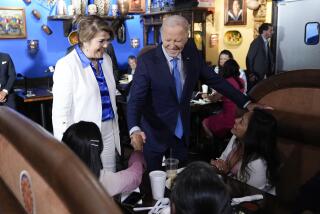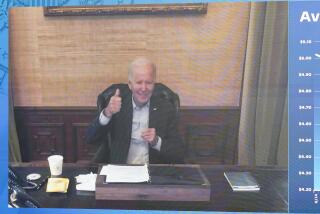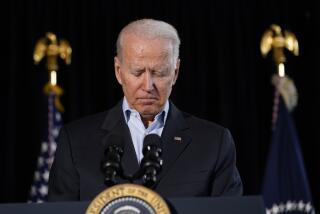Trump hospitalized at Walter Reed for COVID-19 symptoms
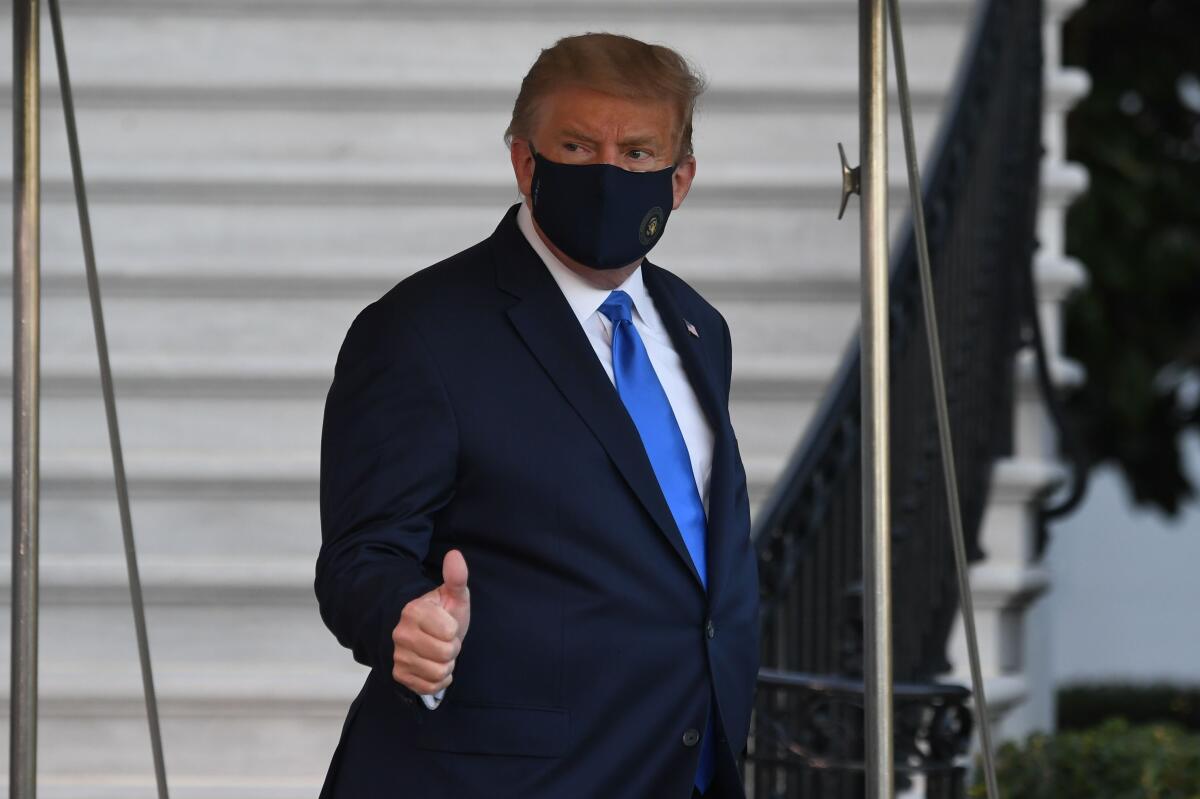
- Share via
WASHINGTON — President Trump was rushed to the hospital for treatment for COVID-19 on Friday evening, less than 24 hours after he tested positive for the coronavirus, and the White House said he would remain at Walter Reed National Military Medical Center for at least a few days as concerns mounted that he could face a severe risk from the deadly disease.
The president’s surprise diagnosis, and worsening condition, sent shock waves across a country already reeling from the pandemic and bracing for a tumultuous presidential election next month that could hinge on Trump’s handling of a public health crisis that has killed more than 208,000 Americans this year.
As senior aides, lawmakers and the Pentagon sought to reassure a nervous public, Trump and the first lady, who also tested positive, spent the day isolated in the White House residence. At sunset, the president walked on his own to the Marine One helicopter on the South Lawn of the White House and was flown to the hospital in suburban Maryland.
Wearing a navy suit, blue tie and a black mask, the president flashed a thumbs-up but didn’t stop to speak to reporters. After he arrived at the hospital at 6:29 p.m., Trump tweeted a video message thanking people for their support.
“I think I’m doing very well, but we’re going to make sure that things work out,” he said.
In a letter released earlier Friday by the White House, Trump’s physician, Dr. Sean P. Conley, said the president “remains fatigued but in good spirits.” White House officials said the president was suffering “mild symptoms” but offered few details.
Kayleigh McEnany, the press secretary, sought to downplay the danger, suggesting Trump was simply shifting his workplace. “Out of abundance of caution, and at the recommendation of his physician and medical experts, the president will be working from the presidential offices at Walter Reed for the next few days,” she said in a statement.
First Lady Melania Trump was not hospitalized, given her symptoms. Conley said she had a mild cough and a headache.
McEnany said the president has not transferred his authority to Vice President Mike Pence. His office said Pence tested negative for the coronavirus Friday, alleviating immediate concerns about the presidential line of succession should Trump become incapacitated and unable to perform official duties.
Trump first announced that he and the first lady had tested positive in a tweet shortly before 1 a.m. Friday. After that, his normal activities ground to a halt.
He didn’t tweet or take part in a planned conference call with governors to discuss the pandemic. His campaign also canceled several announced rallies and events this week featuring the president or members of his family, although some events may be held virtually as the campaign moves into its final month.
Trump is now taking remdesivir, a therapeutic treatment that has shown promise in speeding up recovery time from COVID-19, his doctor said Friday evening.
Conley said Trump does not require any supplemental oxygen and is “doing very well” after arriving at Walter Reed.
The physician said he recommended the president move to the hospital “for further monitoring.” Conley said he worked in consultation with specialists from Walter Reed and Johns Hopkins University.
The doctor had previously said that Trump had been given an experimental “antibody cocktail” from pharmaceutical company Regeneron as well as zinc, vitamin D, famotidine and a daily aspirin as part of his treatment regimen.
Medical experts were alarmed that the president was given a drug still in the testing phase, and said it suggested his condition may be more serious than officials have disclosed.
“You wouldn’t do that with somebody who is just having an uncomplicated case,” said Dr. Amesh Adalja, a senior scholar at the Johns Hopkins University Center for Health Security.
Adalja also said it wasn’t surprising that Trump was hospitalized since he is 74 and overweight, two high risk factors for COVID-19, and reports that he is battling a fever.
“It’s not just a mild case if he’s getting hospitalized,” he said. “It’s likely to have more careful monitoring and more therapy and bloodwork and having nurses and doctors around.”
Former Vice President Joe Biden, the Democratic nominee who pounded Trump’s handling of the pandemic when they met Tuesday on the debate stage in Cleveland, tested negative for the virus Friday, according to his doctor.
Jill Biden, his wife, also tested negative. Both said they were praying for the president and his family.
It wasn’t clear if two more scheduled presidential debates would come off as planned, events that could give Trump an opportunity to rebound from his widely panned performance in Tuesday’s free-for-all.
Pence is scheduled to participate in a debate Wednesday in Utah with Sen. Kamala Harris, the Democratic vice presidential nominee. The event may carry greater importance for voters given the concerns about Trump’s health.
Trump’s activities in the past week may pose a challenge for contact tracing.
In addition to the debate, he hosted two rallies, participated in a dozen events and interacted with numerous supporters and donors, many of whom did not wear masks. Health officials in Minnesota, Pennsylvania and New Jersey urged people who attended his events to get tested if they felt ill.
Republicans struggled to keep their legislative plans on track, including a controversial Supreme Court nomination, while Pentagon officials tried to allay concerns about the nation’s military readiness.
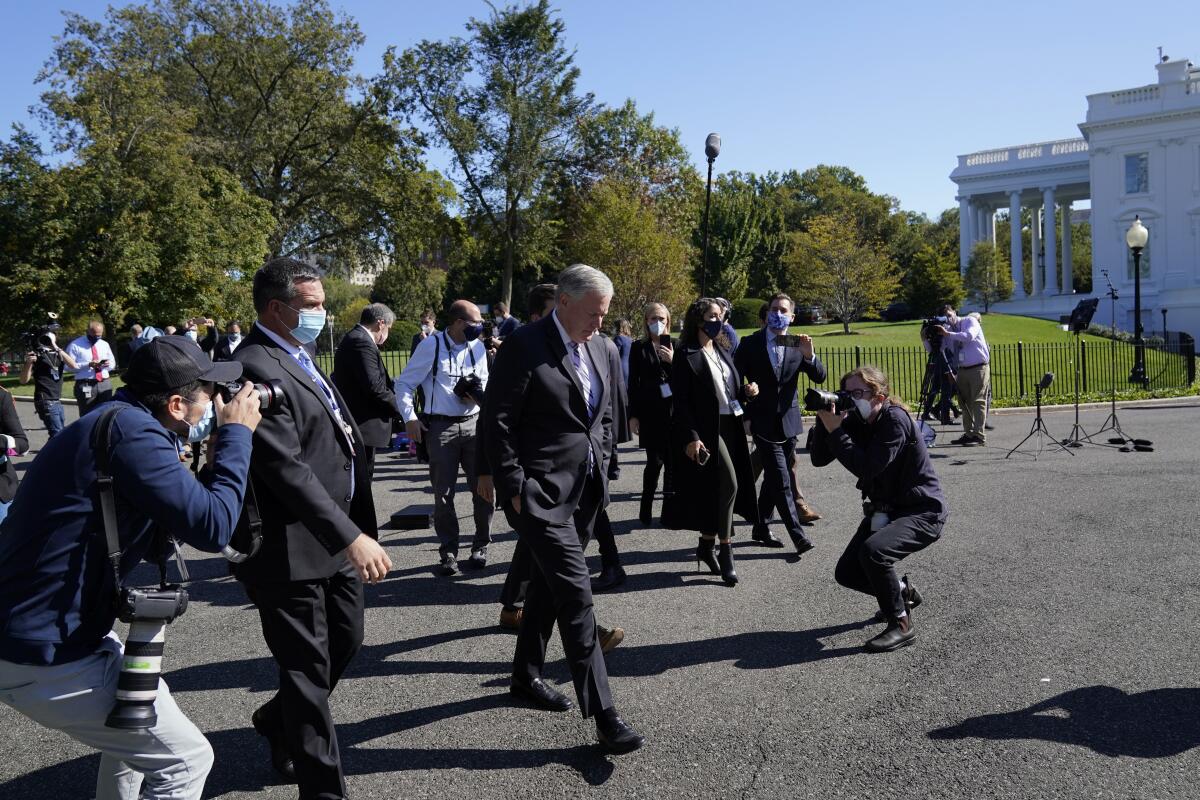
At the White House, some staffers suddenly wore face masks after months of eschewing the practice to placate the president, and senior aides sought to calm public anxieties after Trump’s pre-dawn tweet Friday.
White House Chief of Staff Mark Meadows said Trump showed “mild symptoms” of COVID-19 but was in “good spirits” and energetic. “His first question to me this morning was, ‘How is the economy doing?’”
The first lady posted a brief thank-you message to well-wishers on social media.
“I have mild symptoms but overall feeling good,” she tweeted. “I am looking forward to a speedy recovery.”
Follow along here for the latest about Trump’s positive coronavirus test and what the news means for the presidential campaign.
Although no one else in the president’s inner circle had tested positive, Meadows made clear that he expects the outbreak to spread because the virus is often most contagious before symptoms appear.
“I fully expect that as this virus continues to go on other people in the White House will certainly have a positive test result,” he told reporters.
His prediction proved accurate later that evening, when Kellyanne Conway, a top presidential advisor, tweeted that she had tested positive.
“My symptoms are mild (light cough) and I’m feeling fine,” she said. “I have begun a quarantine process in consultation with physicians.”
Trump’s campaign manager, Bill Stepien, also tested positive for the coronavirus, the campaign confirmed late Friday night — roughly 24 hours after the president’s announcement that he had contracted the virus.
He had been intimately involved in preparations for Tuesday’s debate, meeting with Trump at the White House on Monday and traveling with him on Air Force One to and from Cleveland on Tuesday.
Stepien, the former White House political director who took over the campaign in July, will work from home for the time being.
It’s unclear where the White House outbreak began, but one of Trump’s closest aides, Hope Hicks, tested positive on Thursday. She flew with him recently on Air Force One and Marine One, the president’s helicopter.
Meadows sought to explain Trump’s decision to travel Thursday afternoon to a fundraiser at his golf club in New Jersey after officials knew about Hicks’ test results. He claimed staffers didn’t learn about them until Trump was lifting off the South Lawn in the afternoon, although another aide, speaking on the condition of anonymity, said Hicks’ test had occurred hours earlier.
Ronna McDaniel, the Republican National Committee chairwoman, announced that she had also tested positive for COVID-19. She often travels with the president and was last with him on Sept. 25 when he traveled to Virginia.
Former New Jersey Gov. Chris Christie, one of a half-dozen advisors closely involved with helping the president prepare for his debate Tuesday with Biden, told ABC News Friday that “no one was wearing masks in the room when we were prepping the president.”
Questions and answers about Trump, hospitalized with COVID-19 symptoms, and what might happen next in the election and with any possible transition of power.
Biden, the Democratic nominee, said he would pray for the president and first lady.
“Jill and I send our thoughts to President Trump and First Lady Melania Trump for a swift recovery. We will continue to pray for the health and safety of the president and his family,” Biden tweeted.
The Bidens’ primary care physician, Dr. Kevin O’Connor, said they both underwent PCR testing Friday “and COVID-19 was not detected.”
“Thank you to everyone for your messages of concern,” Biden tweeted later. “I hope this serves as a reminder: wear a mask, keep social distance, and wash your hands.”
Trump had mocked Biden during their debate for limiting his public appearances and frequently wearing masks, as public health experts recommend.
“I don’t wear masks like him,” Trump said. “Every time you see him, he’s got a mask.”
On Capitol Hill, Republicans insisted that the presidential health crisis would have little impact on the effort to hold confirmation hearings before the election for conservative Judge Amy Coney Barrett to fill a vacancy on the Supreme Court.
Senate Majority Leader Mitch McConnell (R-Ky.) tweeted that he and Trump spoke by phone Friday and “talked business — especially how impressed Senators are with the qualifications of Judge Barrett. Full steam ahead with the fair, thorough, timely process that the nominee, the Court, & the country deserve.”
Hours earlier, McConnell sounded more circumspect in a radio interview, calling the virus “the biggest enemy” to a swift confirmation process. Confirmation hearings are scheduled to start Oct. 12, but McConnell said it may be conducted, at least in part, remotely.
But Democrats seized on the fact that Sen. Mike Lee (R-Utah), a member of the Judiciary Committee, also tested positive for coronavirus on Friday, days after he met in his office with Barrett, who was diagnosed with the virus earlier this year but recovered.
Later Friday, another Republican member of the Judiciary Committee, Sen. Thom Tillis, said that he also had tested positive and would self-isolate for 10 days. Tillis is locked in a tight reelection race in North Carolina.
Sen. Ron Johnson (R-Wis.) tested positive Friday afternoon after exposure to another individual with a positive test shortly after he returned to Washington on Sept. 29, according to a statement from his staff. Johnson was previously in quarantine for two weeks after exposure to someone with a positive test on Sept. 14. He tested negative twice during that quarantine period.
The senator felt healthy and was not experiencing symptoms, according to a statement from his staff, and planned to remain isolated until given the all-clear by his doctor.
Sen. Chris Murphy (D-Conn.) called for delaying the confirmation hearings.
“We can’t move forward on Amy Coney Barrett or anything else until we know whether there was some super-spreader event at the White House or at that debate, which has resulted in perhaps more Senate staff and members than Mike Lee contracting this disease,” he said on MSNBC.
House Speaker Nancy Pelosi (D-San Francisco), who is third in the line of succession to the presidency, said she received the news of Trump‘s positive diagnosis “with great sadness.” She said she was tested “out of an abundance of caution” and her results were negative.
“Maybe now that people who see the President of the United States with all the protection that he has and the first lady still having this exposure, it might be, as you say, a learning experience,” she said on MSNBC. “But more than learning, it has to be something that is acted upon.”
Defense Secretary Mark Esper, who last met with Trump on Sunday and is traveling overseas, was awaiting coronavirus test results Friday. Gen. Mark A. Milley, chairman of the Joint Chiefs of Staff, tested negative, according to Jonathan Hoffman, a Pentagon spokesman.
He said the appearance of two E-6B Mercury aircraft, which can serve as airborne command posts in emergencies, on both the Pacific and Atlantic coasts just before Trump’s announcement shortly after midnight were on “preplanned missions” and the timing was “purely coincidental.”
“There’s been no change to [Defense Department] alert levels,” Hoffman said. “The U.S. military stands ready to defend our country and interests. There’s no change to the readiness or capability of our armed forces. Our national command and control structure is in no way affected by this announcement.”
Ashish Jha, dean of the Brown University School of Public Health, said Trump’s diagnosis will create a challenge for tracing his contacts because of the virus’ incubation period, which can last days before it’s detected.
“Anyone near Ms. Hicks from Monday on, President from Tuesday on should quarantine,” he tweeted. “I’d go back, test everyone near President from at least Saturday on to see if we can identify source.”
Times staff writers Jen Haberkorn and David S. Cloud in Washington, Michael Finnegan in Los Angeles and Mark Z. Barabak in San Francisco contributed to this report.
More to Read
Get the L.A. Times Politics newsletter
Deeply reported insights into legislation, politics and policy from Sacramento, Washington and beyond. In your inbox twice per week.
You may occasionally receive promotional content from the Los Angeles Times.
